Facebook Marketplace has become the preferred marketplace for local purchases and sales during the last ten years. Millions of people throughout the world found it easy due to its smooth integration with the giant’s ecosystem and social media trends. There is an ideal online marketplace for you, regardless of your preferences: more products, improved user experience, or more privacy.
These platforms, which range from specialized used clothing applications to local classified ads, provide engaging features and satisfy a wide range of requirements.
Well, we are talking about Facebook Marketplace alternatives. They have grown more relevant as consumers’ expectations for security, privacy, and user experience have increased.
While some of these trending facebook marketplace alternatives in india are generic, others are focused on specific markets. Every platform has a different market, design, working principle, advantages, and disadvantages.
The goal and target audience, entry requirements, scope and features, geographical reach, and reasons why they are excellent Facebook marketplace alternatives are all taken into consideration. In this blog, we will examine some of the top 10 Facebook Marketplace alternatives In India.
What is Facebook Marketplace?
Facebook Marketplace is a tool that lets people trade and purchase things locally.
There might be a range of goods there, including apparel, electronics, vehicles, furniture, and more, much like at an internet garage sale.
To use Facebook Marketplace, simply go to the Marketplace section of the Facebook app or website.
You can list items you want to sell or browse what people in your neighborhood have put up for sale. Any item you choose to click on will allow you to see more details and contact the vendor.
Buyers and sellers can communicate more easily via Facebook Messenger, which enables basic inquiry, price negotiations, and scheduling of meetings to complete the deal. With this local focus, you may get items nearby and not have to worry about shipping.
The popularity of Facebook Marketplace can be attributed to its easy-to-use interface, convenience of connecting with friends and family, and ease of buying and selling.
Why Do People Look for Facebook Marketplace Alternatives?
Extending your sales channels, or multi-channel selling, is more than just a shrewd sales ploy. It is becoming more and more essential in the current highly competitive online selling market.
With the rise of online markets, sellers have many opportunities. However, it is essential to recognize the benefits of cross-platform extension to fully realize this potential. With multi-channel selling, you can adjust your approach to suit these different audience segments. To increase efficiency of your business we are using these free alternative to facebook marketplace.
Revenue Stream Diversification
Reliance on just one platform poses significant risks. Modifications to algorithms, adjustments to prices, or unscheduled service outages can all significantly impact your sales.
A more consistent source of income is encouraged and risk is minimized by adopting diversification, which forgoes an excessive dependence on any one channel.
Brand Exposure
Developing a reputation across several channels leads to additional marketing chances. All it does is make the brand more recognizable and boost potential sales.
Targeting Varied Audience Segments
Different free alternatives to Facebook Marketplace appeal to different kinds of people. For example, Etsy can draw lovers of unique and handcrafted goods, whereas eBay tends to draw collectors and bargain hunters. Tactics can be tailored to appeal to different audience segments by utilizing a multi-channel marketing strategy.
Competitive Edge
Sellers who use more than one channel typically outperform those who use only one. By being aware of the unique features of each marketplace and tailoring their product offers, pricing, and marketing strategies appropriately, sellers can gain a competitive advantage.
Expanding Sales Opportunities
Your audience becomes more diverse when you diversify your internet presence. Every marketplace has a distinct user base of its own. Consequently, testing with different channels increases the likelihood of obtaining purchases by ensuring access to a broad spectrum of consumers.
Some businesses are using social media automation tools like Socinator to streamline their social media presence. Let’s examine these free facebook marketplace alternatives.
Top 10 Facebook Marketplace Alternative
1. Poshmark
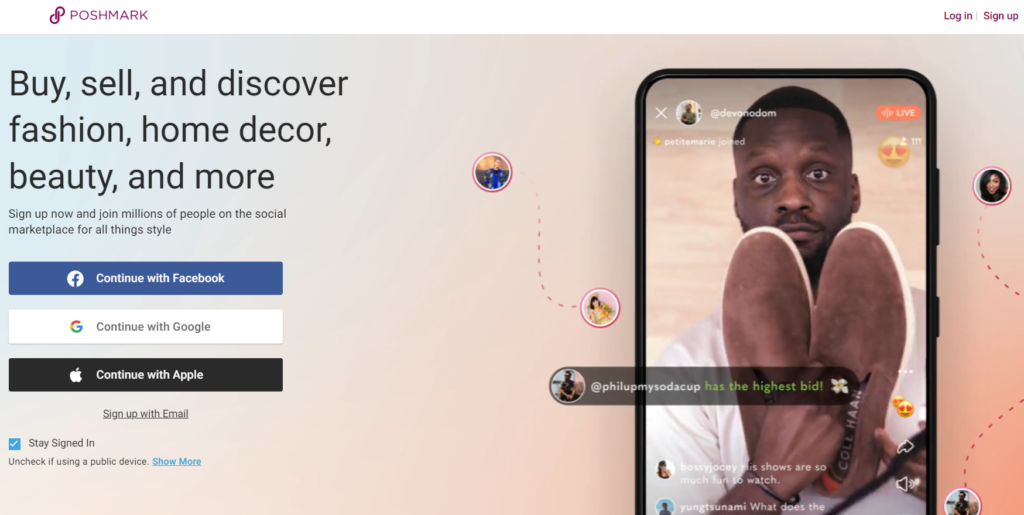
Poshmark was founded in 2011. It combines social media with purchasing. It’s the original platform for “social commerce.” It’s simple to use on your phone for social media, commerce, and shopping. Poshmark offers more than just shopping and selling. Establishing a fashion community is another goal.
With social network features like sharing and following, the program facilitates the process of finding and promoting postings. Poshmark handles the shipping procedures for sellers as well.
But it now includes men’s fashion, kids clothes, and home décor as well. For style enthusiasts who are worried about the unique vibe of the Facebook marketplace, Poshmark is an excellent choice.
Pros:
- Centered on clothing.
- The software verifies the authenticity of premium goods.
- It encourages eco-friendly shopping by offering secondhand goods.
- Listings are promoted by social features.
- manages the logistics of shipping.
- safe method of payment.
Cons:
- substantial commission costs.
- Market niches could restrict the audience.
- More sellers equate to increased competition.
- 20% of sales are paid by sellers, which can lower earnings.
- taking a lot of time to follow and share.
- excellent images and descriptions are necessary.
2. Craigslist
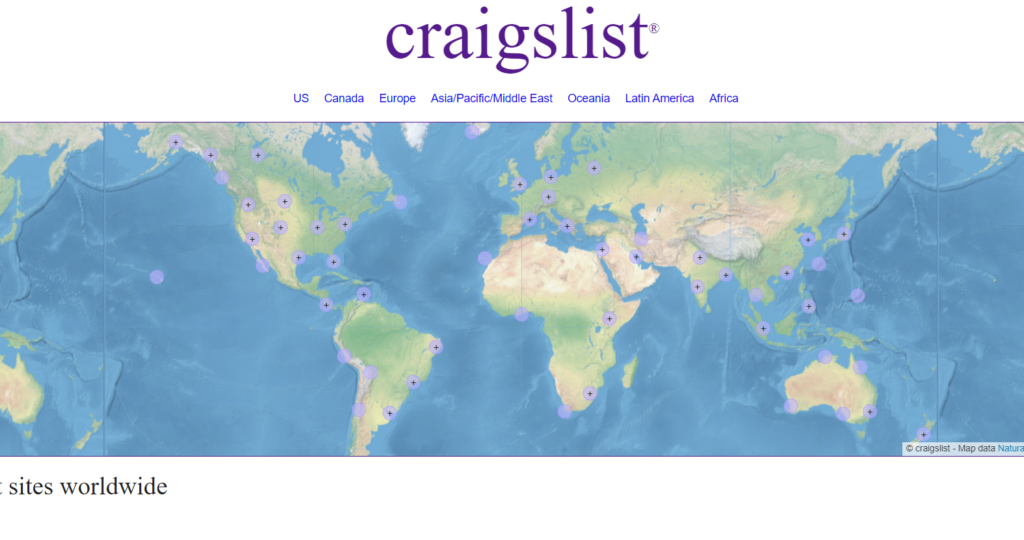
You can use Craigslist to look for used cars, furniture, apartments, jobs, and more in your area. But because there are so many competitors, Craigslist’s hegemony as a one-stop shop has diminished somewhat since its 1995 start.
It includes a broad range of industries, such as services, electronics, furniture, and professions. When users create free listings with photos and descriptions, potential buyers can contact them by phone or email.
Pros:
- Worldwide Reach
- Fewer Distractions
- Information Security
- Wide categories
- Free to use for most of the categories
- Local Focus
Cons:
- No integrated method of payment.
- Limited safety precautions.
- Can attract scammers and spam.
- Minimalist design and lack of a mobile application.
3. eBay
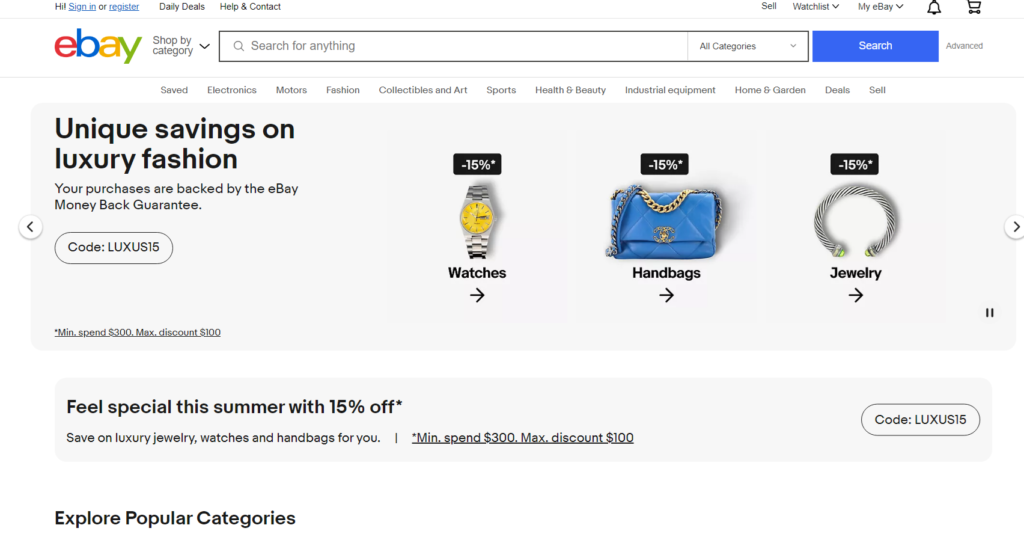
It is the original and most well-known platform for online product sales, having been in operation since 1995. eBay is a hugely popular website, with over 142 million buyers and a presence in 190 regions worldwide.
eBay is a global online free facebook marketplace alternative where users may buy and sell a variety of goods through auctions and shopping. Sellers may post items at a fixed price or put them up for auction.
Buyers can bid on things that are up for auction or make direct purchases at predetermined pricing. eBay offers buyer protection and seller ratings to ensure safe transactions.
Pros:
- Geographical reaches as it has a broad user base worldwide.
- Options with fixed prices and auctions.
- Integrated security for payments.
- Comprehensive assessments and rankings for vendors.
Cons:
- Listing and final value fees.
- competent to contend in the market for sales.
- eBay sellers need to be mindful of numerous expenses.
- If your item has multiple listings, it can vanish.
- requires planning of shipping.
- It takes time to set up extensive lists.
4. OfferUp
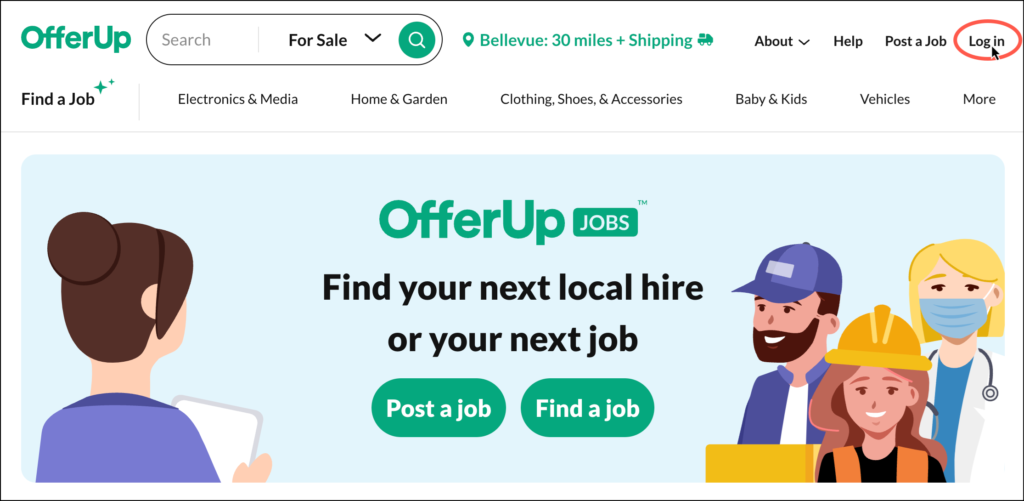
OfferUp is a well-known app that makes local buying and selling easier. It works similarly to Facebook Marketplace. The app has gained popularity as a Facebook Marketplace replacement since its establishment in 2011. After acquiring the local e-commerce site LetGo, it recently saw even more growth. But there are other reasons as well as that why you should use OfferUp.
Pros:
- Free Account
- Ratings & review option for Reputation
- Making use of a mobile app is easy.
- Simple communication via messaging within apps.
- Secure payment methods are available.
- concentrates on local transactions.
Cons:
- Certain products could be overpriced.
- uneven interactions with users.
- Capable of attracting passable offers.
- limited to particular regions.
5. Mercari
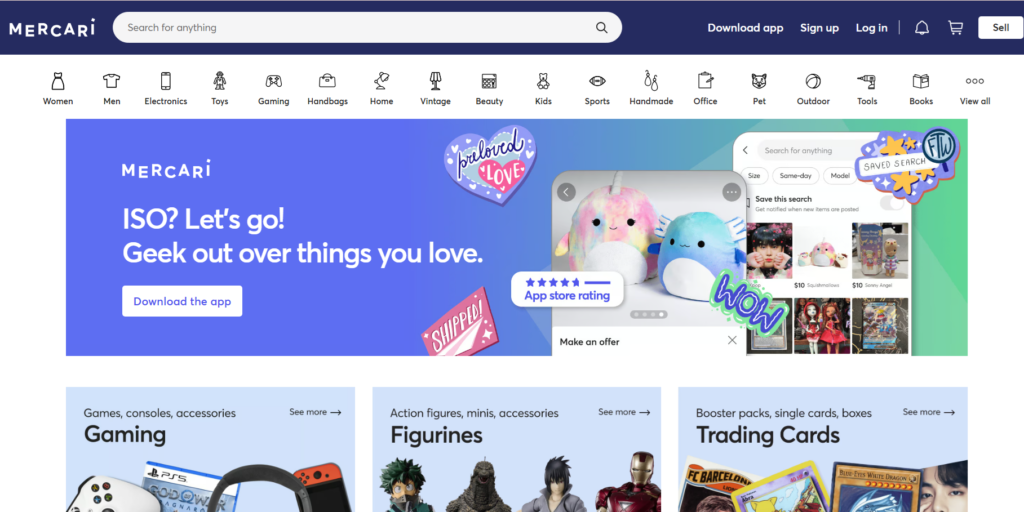
On Mercari, a well-known online marketplace with a sizable user base from the US, UK, and Japan, buyers and sellers can transact with ease. Mercari is the finest alternative to Facebook Marketplace because it lists millions of products and adds 350,000 new ones every day.
Mercari made its debut in Japan in 2013. It’s currently global. The app calls itself “The Selling App.” Mercari is easy to use. Buying and selling is simple and painless. It is divided into many categories for different uses. It functions best while marketing commonplace or unique goods. But more sellers also means more rivalry.
Pros:
- Distribution around the nation expands the viewership.
- Easy listing process using an application.
- safe transactions that protect the seller and the customer.
- Easy-to-use shipping labels with priority.
Cons:
- Commissions earned from transactions.
- Limited to using apps.
- A highly competitive market.
- Shipping management is essential.
6. Bonanza
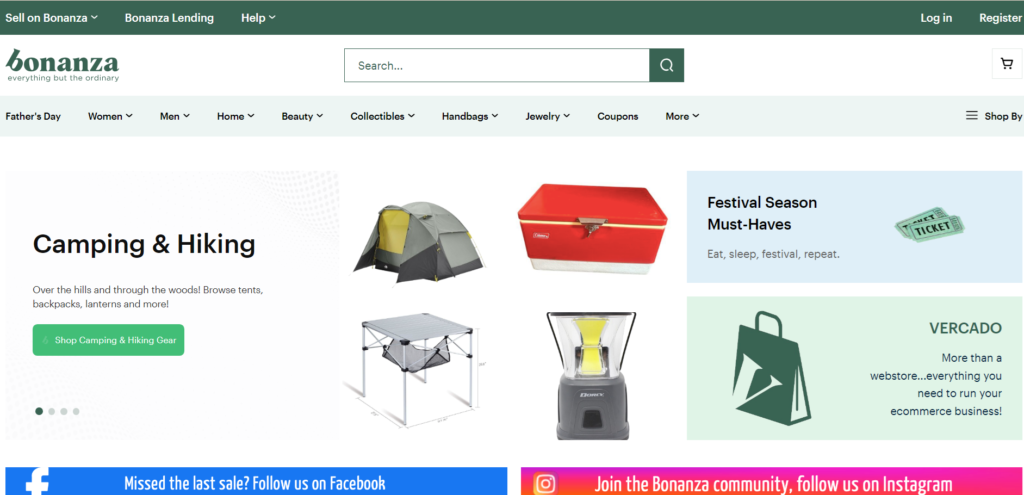
Small and medium-sized enterprises (SMEs), internet merchants, and business owners looking for an e-commerce platform can all benefit from Bonanza. It will appeal to those seeking a more personalized buying and selling experience away from the din of pointless social activities.
To sell on Bonanza, users need to set up a booth, which is essentially their online store. Not only does this promote expert merchants, but it also allows anyone to offer their goods for free and showcase them.
Pros:
- No listing fees
- Encourages professional sellers
- Individuals can also list their items
- Website customization option
Cons:
- Bonanza remains less noticeable. The small size suggests a somewhat less product inventory than eBay.
- There aren’t many choices available for customizing the layout of particular article lists.
7. Depop
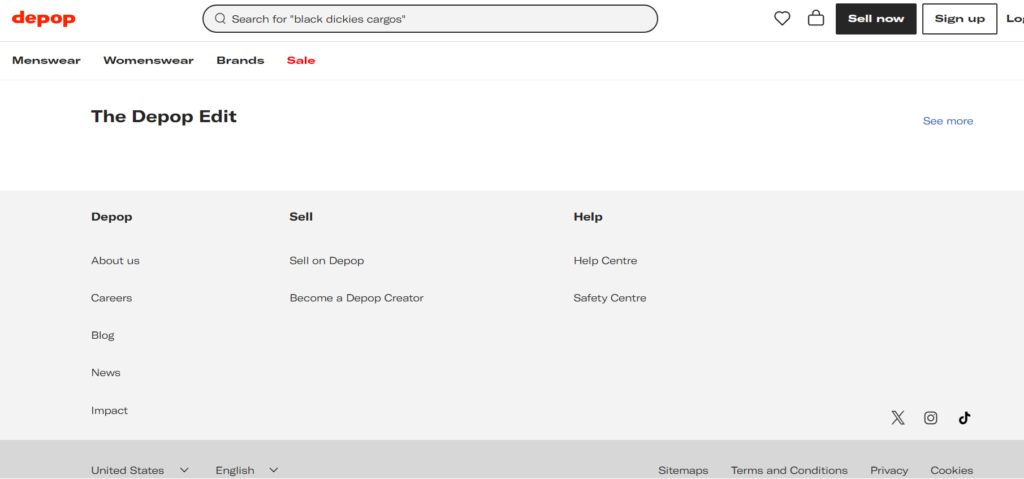
Depop is a another popular facebook marketplace alternative smartphone marketplace for purchasing and selling fashionable goods among younger users.
Users can combine elements of social networking with online shopping by following one another and liking or commenting on listings. Transactions and shipping are made simpler by the app.
Depop is an online marketplace specializing in unique fashion items, vintage goods, and handcrafted goods, mostly for the fashion resale market. The portal is well-liked by Gen Z and millennials who value vintage goods, unique finds, and sustainable fashion.
Pros:
- Sell unique fashion pieces, vintage items, and handmade goods
- Built-in payment processing system
- combines social media with sales.
- Product listing on the app is easy.
Cons:
- Users need to create an account
- Sellers must set up a profile with relevant payment details
8. Etsy
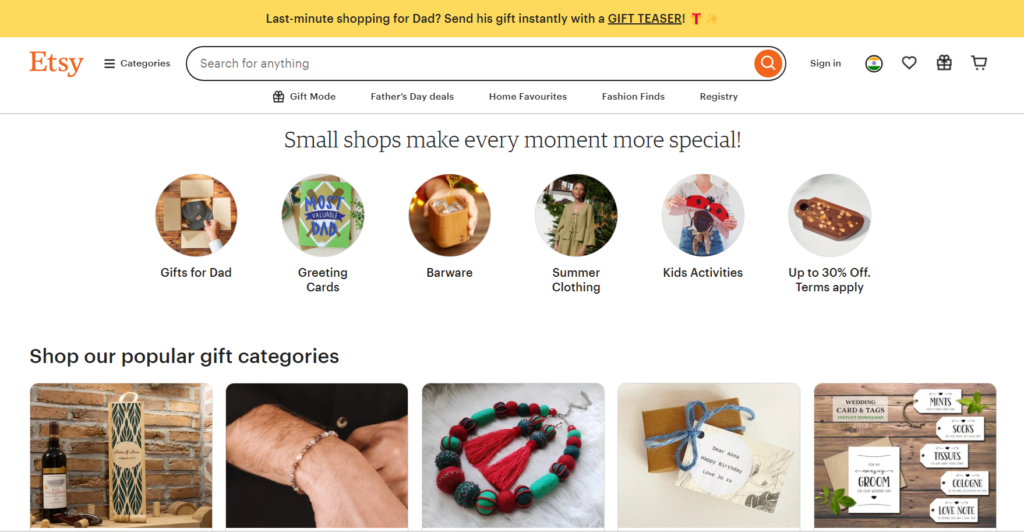
Etsy was founded in 2005. It is intended for those who enjoy vintage or handcrafted goods. Etsy offers a vast assortment of handmade items. There are things like mugs, t-shirts, and Christmas decorations. Etsy specializes in vintage and handcrafted goods. Customers are looking for sentimental home accessories and unusual gifts on Etsy.
Popular online retailer Etsy provides a welcome change of pace from Facebook Marketplace. Etsy is a place where customers may find unique things that are hard to buy elsewhere because of its focus on handmade, vintage, and distinctive products.
Pros:
- Because they appreciate homemade goods, Etsy consumers are willing to pay for them.
- By using the Facebook marketplace, vendors may connect with customers all around the world.
- perfect for the unique and homemade stuff.
- global marketplace.
- Instruments to advertise your shop.
- secure processing of payments.
- Sellers can personalize items for you.
Cons:
- Etsy charges for its services. It is difficult to understand.
- It’s challenging to stand out when there are so many vendors.
- fees related to transactions and listings.
- Market specializations may limit the viewership.
- an arduous procedure to launch a store.
- need precise photos and product descriptions.
9. Nextdoor
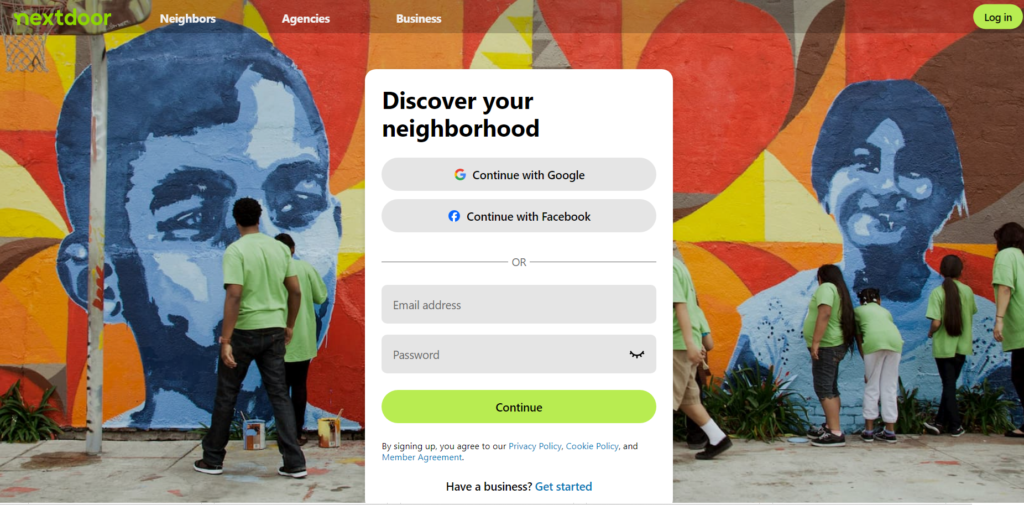
A platform for neighborhood news, events, and classified ads is provided by Nextdoor, a social network for neighbors.
Users can post free or for sale things in the classifieds section. For those looking to buy or sell locally and engage with their neighbors, it’s an excellent option.
Since Nextdoor is a neighborhood-based network that connects people, it’s a great replacement for Facebook Marketplace. For both buying and selling, Nextdoor provides a decent alternative to Craigslist, saving you the hassle of interacting with independent merchants or pawn shops.
Pros:
- Establish a rapport with the community.
- It is easy to list items for sale online.
- Great for quick local transactions.
- Use it for free.
Cons:
- Fees related to transactions and listings.
- Market specializations may limit the viewership.
- An arduous procedure to launch a store.
- Need precise photos and product descriptions.
10. Vinted
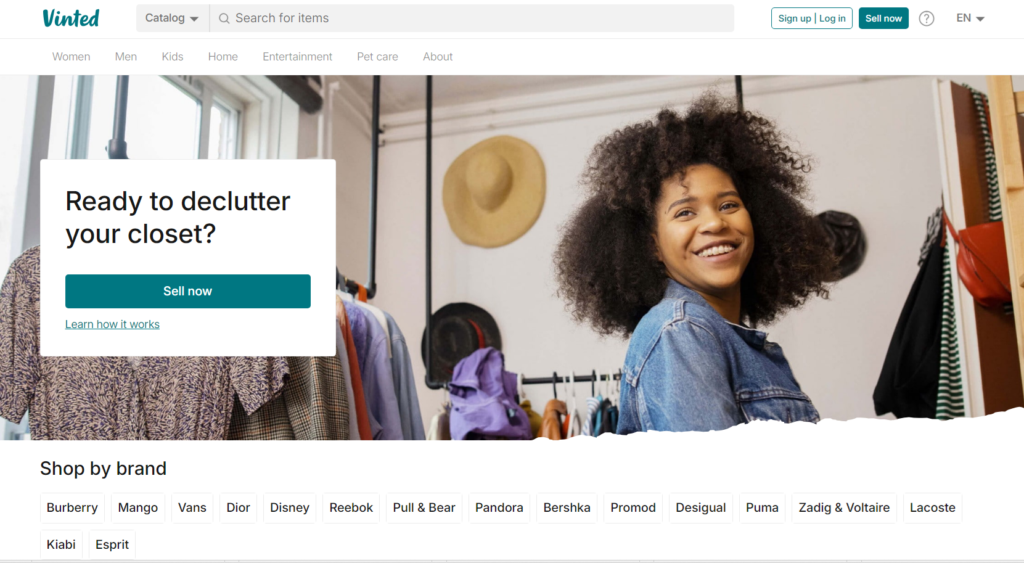
Vinted is an online store that exclusively offers apparel from the past. The website encourages reusing anything from clothing and accessories to shoes and bags. Its sustainable approach appeals to environmentally conscious customers, and the platform’s treasure-hunting vibe makes fashion recycling both ethical and stylish.
In Lithuania, Vinted was established. It is related to retro apparel. It’s user-friendly and makes finding environmentally friendly clothes easy. The only retailer of used clothing, accessories, and shoes is Vinted. It is beneficial for individuals who care about the environment.
Pros:
- No selling fees: The sellers get all of the money that buyers pay them.
- Eco-friendly narrative: Catering to the growing population of buyers who care about the environment.
- Swap option: A unique feature that enables users to exchange items.
Cons:
- Less control over shipment: Since customers are free to choose their preferred shipping method, retailers have less control over this facet of their business.
- A specialized market that just sells clothing, narrowing the pool of potential clients.
Conclusion
In conclusion, there are a ton of fantastic online free facebook marketplace alternatives for buying and selling, even though Facebook Marketplace is a popular choice. Every choice offers different features and benefits for different requirements.
No matter what kind of products, level of user-friendliness, or sizeable customer base they are searching for, there is a platform out there for everyone.
Search options like Craigslist, eBay, and Etsy to find the best fit for your requirements. With its auction-style postings, eBay provides a wide range of goods, whereas Etsy provides a creative space for antique and handcrafted goods. Craigslist facilitates local business, which in turn fosters community bonds.
You ought to carefully consider these options if you wish to simplify the online purchasing and selling process.
Take into account elements like the product kind, the target market, and usability. You’ll be able to choose the platform that best suits your needs by doing this.
FAQs
1. What are some Facebook Marketplace alternatives app or websites?
Facebook Marketplace has several competitors, such as Craigslist, OfferUp, Letgo, and eBay Classifieds.
2. Which other marketplace works best for local purchases and sales?
Popular local marketplaces for buying and selling goods are OfferUp and Letgo.
3. Are there websites or other venues designed just for the sale of unusual or handmade goods?
Etsy is a well-liked website for selling unique or handcrafted goods, providing a market specifically designed for makers and artists.
4. Do these substitute platforms provide safe ways to make payments?
Secure payment methods are offered by websites such as OfferUp and eBay Classifieds to safeguard both customers and sellers during transactions.



